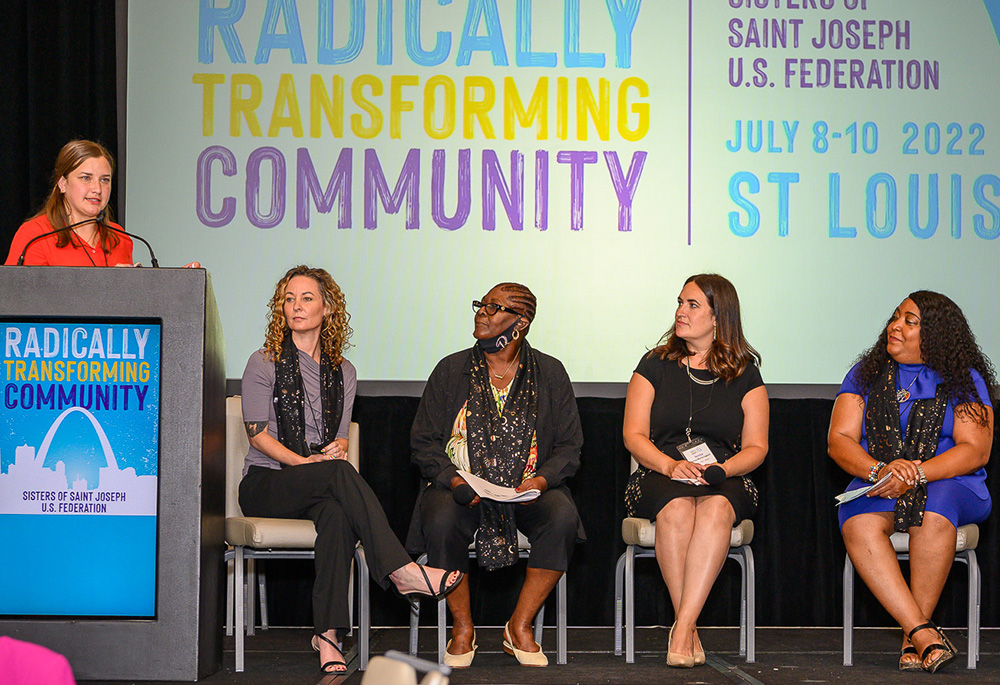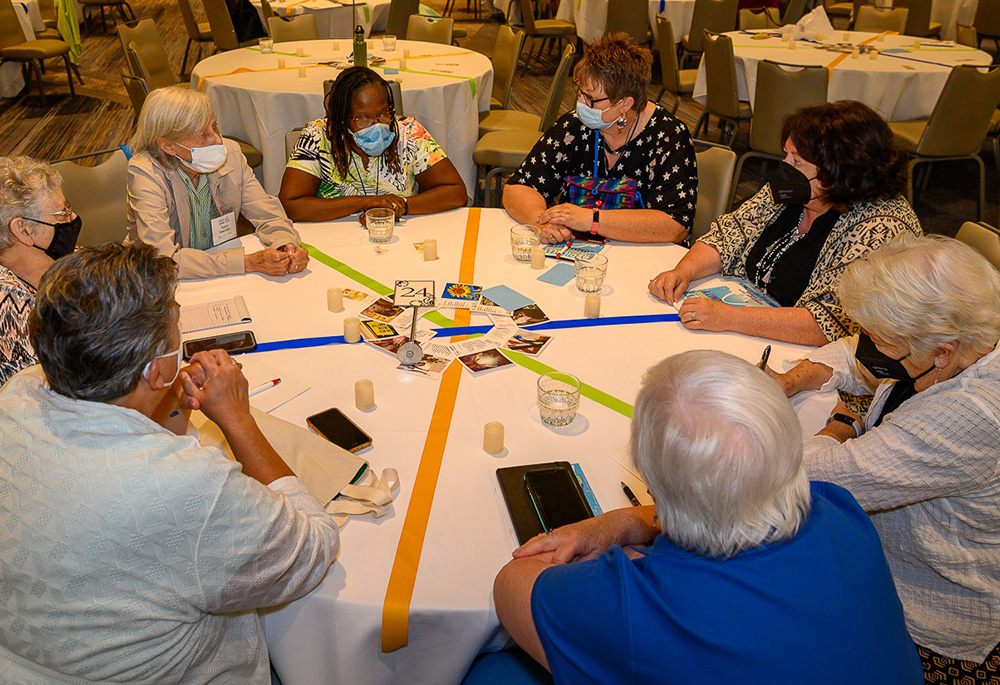
Panelists discuss injustices within the U.S. prison system at Event 2022, held July 8-10 in St. Louis, Missouri. Pictured (from left) are Lisa Cathelyn, April Foster, Barb Baker, Serena Martin-Liguori and Shameka Parrish-Wright. (Mary Sue Rosenthal Gee)
Looking both inward and outward, the 16 congregations that make up the family of St. Joseph in the United States recently gathered in St. Louis to reflect on the future — their own and that of the society and world in which they live out their charism of unifying love.
Titled "Radically Transforming Community" and sponsored by the Federation of the Sisters of Saint Joseph, Event 2022, held July 8-10, brought to the city some 450 sisters and federation members — an extended family of associates, agrègées (permanently vowed lay members), St. Joseph Workers, partners in mission, students and friends. Another 600-plus joined virtually.
The weekend began on a soft note, with a keynote address by St. Joseph Sr. Lynn Levo focused on personal psychological empowerment and caring one-to-one relationships as essential starting points for living radically. The program gradually crescendoed, culminating in a model of radical strategic action: an on-the-spot collection resulting in $15,000 to be divided among three organizations advocating for prison and bail reform. All three organizations had been represented on a speakers' panel at the event.
"We must share life's energies with one another in order to create the world we hunger for," Levo said in a talk sprinkled with definitions of radical she found online. But surfacing those energies, she said, depends on getting beyond "descriptors" — words used to complete the sentence "I am," which characterize us by race, intellectual ability, temperament, even astrological sign, for instance — all of which reflect only the surface of who we are.
Attachment to those descriptors "leads us to spend a tremendous amount of energy defending who we are" and prevents us from entering deeply into community. When we leave the descriptors off, and simply recognize that I am and you are, we acknowledge our common humanity rather than dwell on our differences, she said.
Sr. Mary Flick of St. Louis said the inward-outward movement reflected for her the heart of what it means to be a member of the St. Joseph family. "At the heart of who we are is that call to spirituality and to relationship," she said in an interview. "It starts with one-on-one for me, finding that sense of commonality, and then we can look at systems and dream together."
Much of the remainder of the weekend program centered on speakers committed to ending racial oppression, especially as it manifests in the U.S. criminal justice system. The names George Floyd and Breonna Taylor, whose deaths in 2020 sparked widespread outrage against police brutality and systemic racism, surfaced often.
Speaker Olga Marina Segura, author of Birth of a Movement: Black Lives Matter and the Catholic Church, reflected on her personal journey through the Black Lives Matter movement and the nascent abolitionist movement, which calls for abolishing punitive systems and practices and the conditions, such as racism and poverty, that lead to them.
The more involved in Black Lives Matter she became, the more she began to "challenge the whiteness of Catholicism," as she recognized how the church has been shaped by colonialism and oppressive power, she said. As a Black Catholic immigrant from the Dominican Republic, her goal now is to galvanize white Catholics "to confront their privilege and consider how they have engaged in oppression," and to ask "what are some ways I can now use my white privilege" to uplift marginalized people.
A panel of four laywomen, two of them Black and three formerly incarcerated, focused on injustices within the U.S. prison system, motivating the St. Joseph family to address that challenge with an on-the-spot donation.
Serena Martin-Liguori, a former student at St. Joseph College (now University) in New York, became an impassioned advocate for incarcerated women following her experience as a prisoner in a New York prison.
"Overwhelming obstacles as an adolescent" led to her incarceration at age 19 in Bedford Hills Correctional Facility, the largest women's prison in New York state. She turned 21 in prison and spent months in protective custody, alone for 23 hours a day in a cell with three concrete walls. That experience led to her become a fierce advocate for incarcerated women. "After all the pain, I realized there might be a silver lining," she said, and she set about bringing to women in prison "every service I did not receive."
Liguori is currently executive director of New Hour for Women and Children-Long Island, which has its roots in a ministry sponsored by the Sisters of St. Joseph of Brentwood, New York, and she has enjoyed strong support from many St. Joseph sisters in her work. New Hour's numerous supportive programs include parenting classes, help with reentry after release from prison, and a nursery program for new mothers with babies.
New Hour was one of the three programs to receive a share of the $15,000 raised through the St. Louis event. The others are The Bail Project, a national organization that provides bail and pretrial support to low-income people, and Keyway Center for Diversion and Reentry, a St. Louis-based organization that supports women reentering the St. Louis community after incarceration.
"Paying bail for someone disrupts a system that criminalizes race and poverty" and restores a basic right to innocence until proven guilty, said Shameka Parrish-Wright, who, though she believed she was innocent, was arrested and charged and forced to take a plea deal offered by a public defender because she had no money for bail. She is community advocacy and partnership manager for The Bail Project in Louisville, Kentucky.
Speaking as executive director for Keyway, April Foster stressed that, of people in prison, "95% will return to the community. We have to support them!" Barb Baker, Keyway's advocacy director, noted that a piece of Missouri legislation close to her heart had resulted from the center's advocacy work: the prison nursery bill. Signed into law on July 1of this year and effective in July 2025, the measure allows eligible women who give birth in prison to stay with the child for 18 months.
One of Baker's most painful memories was having her child taken from her after she gave birth in prison.
Lisa Cathelyn, justice, peace and integrity of creation coordinator for the federation, said event organizers had chosen to support the three organizations because racism, "the original sin of this country," manifests itself in incarceration. Further, she noted in an interview that St. Joseph sisters historically since their founding in 1650 in Le Puy, France, have served incarcerated people and been incarcerated themselves, even executed, for civil disobedience. The federation released a "Corporate Voice Statement," calling for elimination of the cash bail system.
Along with Meg Olson, representing Network, the Catholic social justice lobby, at the event, Cathelyn urged attendees to phone President Joe Biden, asking him to establish a federal reparations committee to study ways to implement restorative justice for descendants of enslaved men and women.
Kristen Whitney Daniels, the federation's associate director, said the issues and actions showcased at the event, while they may have had a "progressive" feel, were simply projected into the future by the sisters' historic radicalism. "When we really look at our roots, our sisters have historically been on the radical front of issues," she said. In the planning, "space was intentionally made for new and younger ideas," she said, but program choices were "fully fueled by our charism and the trail the sisters have blazed before us."

The Federation of the Sisters of St. Joseph's Event 2022 was held July 8-10 in St. Louis. Some 450 sisters and federation members attended. Another 600-plus joined virtually. (Mary Sue Rosenthal Gee)
Another panel, "Further Insights on Radical Community" brought together four speakers with experience in transforming communities in novel ways. The panel evolved from planners' intent to model new ways of being in and building community as social changes demand greater inclusivity and religious congregations expand through new ways of belonging. (See sidebar.)
"We are expanding our consciousness of who is our neighbor to include not only the most marginalized people, but also the earth and the universe," Sr. Maryellen Kane, executive director of the federation, said in an interview. "Maybe once it meant the Catholic people, but certainly no more. We want to build relationships with all who are working for a just and peaceful society."
This year's event was only the second such gathering open to non-sisters. The first was in 2016.*
*An earlier version of this story gave incorrect historical information about the event.
Advertisement







